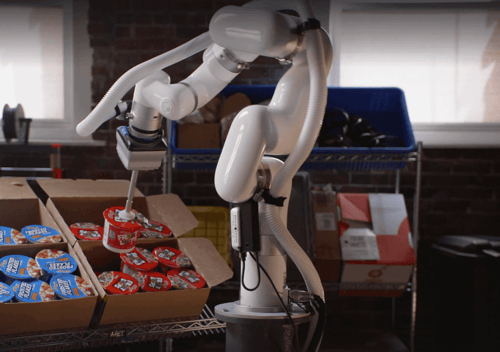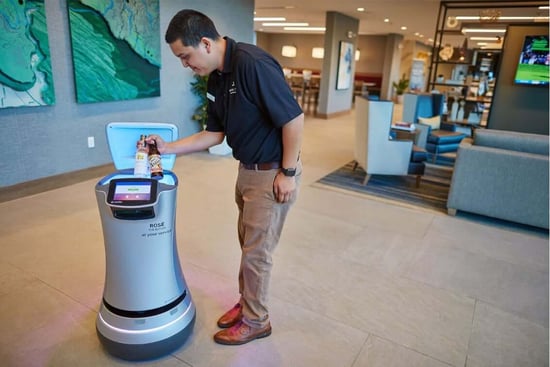HaaS 100 (April 2024)
by Zachary Kimball on February 29, 2024
Hardware-as-a-service (HaaS) is gaining momentum across a variety of industries. Many of the early adopters of HaaS are in robotics, offering robots-as-a-service (RaaS) to decrease barriers to entry and improving overall value to customers. Others offer machine-as-a-service (MaaS), device-as-a-service (DaaS), or equipment-as-a-service (EaaS).
Some companies pitch outcomes more than assets, offering data-as-a-service or platform-as-a-service models. From construction layout, first-response drones, and delivery robots, to occupancy sensors and piece-picking, these companies are on the cutting-edge of their fields.
This post is one in a series about modern hardware companies, their business models, and the future of HaaS. For more, see volume 1, volume 2, and volume 3.
Dusty Robotics

- Founded date: 2018
- Location: Mountain View, California
- Employees: ~84
- What they do: Construction layout automation
- Key customers: Skanska, California Drywall, Truebeck Construction
- Website: dustyrobotics.com
Dusty Robotics sells the FieldPrinter, a robot that automates construction layouts. By optimizing these critical processes, Dusty is revolutionizing construction practices, helping builders save time and resources while achieving exceptional results.
Dusty offers several pricing solutions. Builders can opt for a project-based lease, granting them unlimited FieldPrinter usage for specific jobs, complete with training, support, and the option for CAD drawing assistance. Alternatively, an annual subscription ensures FieldPrinter availability across all projects, with training for operators, ongoing support, and unlimited usage throughout the subscription period.
“Dusty's subscription options meet construction customers where they are by providing an equipment rental service. Rather than dealing with equipment maintenance and obsolescence, construction firms get unlimited upgrades, and ensure that each job gets to make use of the latest software and hardware," says Tessa Lau, CEO of Dusty Robotics.
BRINC

- Founded date: 2019
- Location: Seattle, Washington
- Employees: ~100
- What they do: Drone and smart "phone" for first responders
- Key customers: New York Police Department (NYPD), Seattle Police Department (SPD)
- Website: brincdrones.com
BRINC creates technology for first responders. Their equipment helps de-escalate dangerous situations, including two primary offerings in the field: a drone for extreme environments and a public-safety communications device.
The former is the LEMUR 2, a first-response drone used for everything from hazmat responses to bomb disposal operations to hostage rescue. The LEMUR 2 is equipped with LiDAR, floodlights, night vision, and a thermal sensor that allow the drone to “see." They also offers the BRINC Ball, a “throw phone” with a microphone and speaker that first responders can toss or throw into an at-risk environment to establish and maintain contact for peaceful resolutions.
BRINC’s hybrid as-a-service model allows it to sell its hardware outright under a capex model, and then charge a monthly subscription fee for data and proprietary software. The BRINC ball is available for purchase for $2,000; plus $49/month for the Ball Protection and Data Plan. The LEMUR 2 costs $10–20k, and software subscription rates are not published. The company also offers a series of add-on services, such as hardware replacement and training programs.
Relay Robotics
- Founded date: 2013
- Location: Silicon Valley, California
- Employees: ~50
- What they do: Autonomous delivery robots for healthcare and hospitality
- Key customers: HCA, Dignity Health, Hutchinson Health, Marriott, Hilton, Westin and more
- Website: relayrobotics.com
Relay Robotics provides simple, sophisticated, autonomous service robots that work with humans safely, securely, and reliably. The robots supplement staff in both healthcare and hospitality industries. These robots free up staff time by performing time-consuming deliveries – safely, securely, and cost-efficiently. They seamlessly ride elevators and open automated doors.
Relay offers its technology for purchase as well as robots-as-a-service (RaaS), making their solutions accessible without upfront costs. They also provide Rapid-Install™ services, ensuring quick deployment and allowing clients to personalize their robots with names and customized wraps.
“We offer an all inclusive RaaS program which is especially well suited to hotels — it includes the robot, our proprietary "Relay RoomService" integrated F&B ordering system, all integrations for doors, elevators, service and maintenance, and 24x7 support. The robot delights guests, generates additional hotel revenues while freeing up staff to do other work, all without a large upfront investment or having to maintain it themselves. It’s a no brainer for our customers,” says Wade Pfeiffer, CEO of Relay Robotics.
Density

- Founded date: 2014
- Location: San Francisco, California
- Employees: ~131
- What they do: Workplace occupancy sensors and analytics
- Key customers: Uber, Pinterest, Shopify, Okta
- Website: density.io
Density’s solution offers innovative radar sensors and analytics software that empower businesses to make data-driven decisions about their real estate needs. Density's product lineup includes Open Area Long Range (LR) and Open Area Short Range (SR) radar sensors, designed to provide accurate insights into workspace occupancy and utilization. The LR sensor is ideal for large spaces, covering up to 1,000 square feet per sensor, while the SR sensor is tailored for small spaces and single occupancy areas.
Density offers its analytics via a subscription model called Coverage Pricing. The model is based on square footage rather than a per-sensor fee, simplifying ROI calculations for customers.
Tutor Intelligence

- Founded date: 2021
- Location: Boston, Massachusetts
- Employees: ~14
- What they do: AI cobots that work right out of the box
- Key customers: undisclosed
- Website: tutorintelligence.com
Tutor Intelligence creates AI cobots to work alongside human workers in American factories. Unlike traditional options, Tutor cobots arrive ready to work out of the box, requiring only power and WiFi to operate. Equipped with 3D AI vision, they can process their environment and adapt to various tasks, such as conveyor loading, end-of-line packing, and kitting. These cobots are designed to handle changeover seamlessly, with no downtime or need for onsite engineers.
Tutor offers their cobots for $12/hr. Their goal is to provide operational and financial flexibility beyond the typical options. With a no-commitment model, facilities can scale their automation needs without long-term commitments or upfront investments.
- HaaS (78)
- hardware as a service (77)
- haas100 (43)
- business model (10)
- billing (7)
- contract (4)
- equipment (4)
- RaaS (3)
- accounting (3)
- asset management (3)
- financing (3)
- operations (3)
- MSP (2)
- legal (2)
- managed service provider (2)
- revenue (2)
- robotics (2)
- robots-as-a-service (2)
- DaaS (1)
- MaaS (1)
- actions (1)
- assets (1)
- business model examples (1)
- device-as-a-service (1)
- eaas (1)
- equipment-as-a-service (1)
- finance (1)
- hardware financing (1)
- machine-as-a-service (1)
- metrics (1)
- pricing (1)
- product update (1)
- sales tax (1)
- solution definition (1)
- tax (1)
- February 2026 (1)
- January 2026 (3)
- December 2025 (1)
- November 2025 (2)
- October 2025 (2)
- September 2025 (2)
- August 2025 (3)
- July 2025 (3)
- June 2025 (2)
- May 2025 (2)
- April 2025 (2)
- March 2025 (4)
- February 2025 (4)
- January 2025 (3)
- December 2024 (3)
- November 2024 (2)
- October 2024 (2)
- September 2024 (3)
- August 2024 (2)
- July 2024 (2)
- June 2024 (2)
- May 2024 (1)
- April 2024 (2)
- February 2024 (3)
- January 2024 (3)
- December 2023 (3)
- November 2023 (3)
- October 2023 (3)
- September 2023 (1)
- August 2023 (2)
- July 2023 (2)
- June 2023 (1)
- May 2023 (1)
- April 2023 (2)
- March 2023 (1)
- February 2023 (1)

